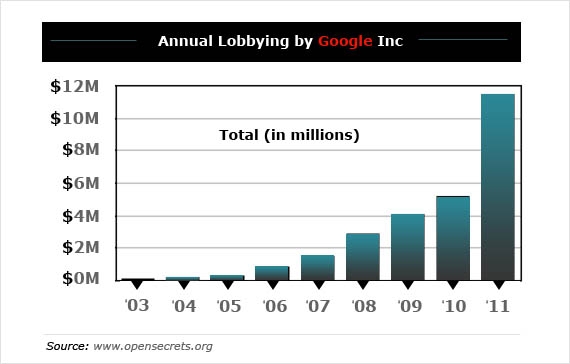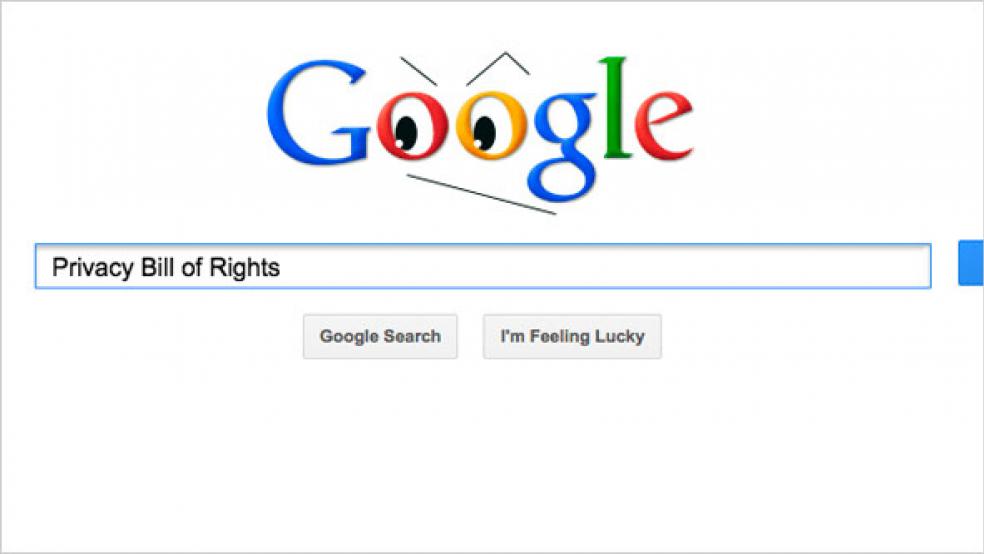The “Consumer Privacy Bill of Rights” issued by the Obama administration Thursday is another reminder of the increased attention being paid by lawmakers to companies like Google and Facebook – and the increased attention those companies are paying to Washington in return.
The White House proposal is essentially a “blueprint” for potential legislation intended to give web users more say over how their personal information is used online. Whether or not that legislation materializes or gets passed, though, the Commerce Department will work with Internet companies to develop “enforceable codes of conduct” based on the ideas it has laid out (see the seven key points in the bill of rights in the chart, below).
RELATED: Google Reminds Us What It's Really Selling: Us
The White House says its proposal applies to “personal data,” which it defines rather broadly as “any data, including aggregations of data, that is linkable to a specific individual.” To go with the announcement of the Bill of Rights, the Digital Advertising Alliance, a consortium of ad networks and leading Internet companies, committed to use “Do Not Track” technology in web browsers, which would let users stop the companies from keeping tabs on their online activities.
If that all sounds like a win for privacy advocates and consumer groups, those organizations aren’t celebrating just yet. Instead, they lauded the move as a “good start” before quickly pointing out we’re still a long way from knowing exactly what privacy protections will ultimately be put into effect. “It is apparently a step forward for consumer privacy, but we’ve got some concerns about it,” John Simpson, director of Consumer Watchdog’s Privacy Project, told The Fiscal Times.
For one thing, the proposal right now lacks real teeth. “The new framework largely depends on the development of voluntary codes of conduct, to be negotiated between consumer groups and companies like Google, Facebook, Microsoft, Yahoo and others,” the Center for Digital Democracy, a consumer protection group, noted in a statement released to the press. Instead, that group and others say they would have preferred legislation. The Center for Digital Democracy also worries that the White House move could undercut what it sees as a stronger and more consumer-oriented approach to privacy protection being taken by European Union regulators.
Privacy advocates say they will be happy to sit down with the Internet companies as part of the process the White House set forth – but they remain wary that consumers’ interests will take a backseat to promoting future growth for the businesses. “The real test is how the whole process unfolds when they try to implement the blueprint. That’s where it may get a little bit dicey,” Simpson says. “At the end of the day, the question is going to be to what extent is industry going to be able to work their inevitable magic to try and water down the rules so that they become essentially meaningless. I think that’s a real danger.”
Mr. Page and Mr. Zuckerberg Go to Washington
Inevitable or not, that magic gets worked by lobbyists – and companies like Google and Facebook have already demonstrated they know that well. “Internet companies have certainly increased their Washington presence,” says Viveca Novak, a spokesperson for the Center for Responsive Politics. “The SOPA debate and other issues have certainly shown them they need to be paying attention to what’s going on in Washington and have a hand in the game.”
Facebook, for example, started a political action committee last fall. Google has co-sponsored a GOP primary debate and a Google+ “Hangout” with President Obama. And just yesterday, Google named former Susan Molinari, a former Republican congresswoman from New York, as its vice president of public policy and government relations for the Americas – essentially its chief lobbyist.
Molinari will have plenty of money to back up her efforts. As CNET’s Jay Greene noted last month, the search giant spent $9.68 million on federal lobbying last year, 88 percent more than it did in 2010. In disclosure filings, Google said its lobbying efforts covered “regulation of online advertising” and a bill called the Do Not Track Me Online Act as well as other issues such as cloud computing, renewable energy and international censorship. (Microsoft, by comparison, spent $7.34 million on federal lobbying in 2011, while Yahoo spent almost $2.5 million and Facebook spent $1.35 million.)

Google’s increased lobbying efforts have come at a time when the company faces increasing criticism for the way it uses its dominant position in the world of online search, and increased scrutiny of its privacy policies. In August, the company agreed to pay $500 million to settle an investigation by the Justice Department for knowingly running illegal ads from online Canadian pharmacies. And last month, Google set off something of a firestorm when it announced it was consolidating the privacy policies governing dozens of its products, like YouTube, Gmail and Maps – a move that would allow information to be shared across all those sites and services. A group of 36 state attorneys general sent a letter to Google CEO Larry Page this week to express their “strong concerns” about the new policy.
Google’s lobbying expenditures may not be a lot compared to the $66 million spent by the U.S. Chamber of Commerce or the $26 million spent by General Electric, but “it’s a lot compared to what they were doing before,” Novak says.
As the privacy debate continues over the coming months, or years, we should get a better sense of what kind of return Google is getting on that increased spending.
7 Key Points in the White House’s Consumer Privacy Bill of Rights:
- Individual Control: Consumers have a right to exercise control over what personal data companies collect from them and how they use it.
- Transparency: Consumers have a right to easily understandable and accessible information about privacy and security practices.
- Respect for Context: Consumers have a right to expect that companies will collect, use, and disclose personal data in ways that are consistent with the context in which consumers provide the data.
- Security: Consumers have a right to secure and responsible handling of personal data.
- Access and Accuracy: Consumers have a right to access and correct personal data in usable formats, in a manner that is appropriate to the sensitivity of the data and the risk of adverse consequences to consumers if the data is inaccurate.
- Focused Collection: Consumers have a right to reasonable limits on the personal data that companies collect and retain.
- Accountability: Consumers have a right to have personal data handled by companies with appropriate measures in place to assure they adhere to the Consumer Privacy Bill of Rights.





